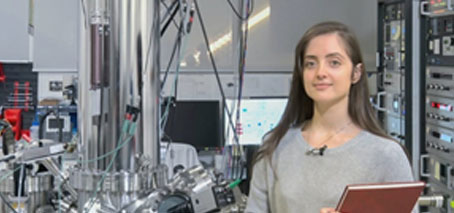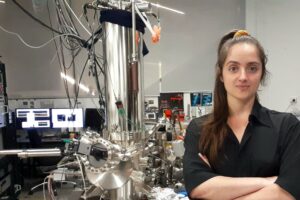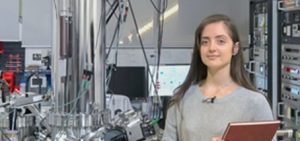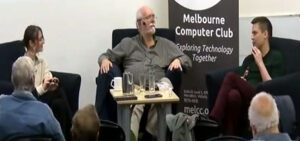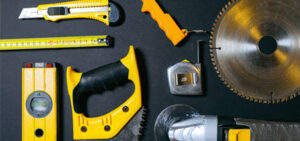Congratulations to FLEET Research Fellow Dr Iolanda Di Bernardo (Monash), who has received the highly prized Juan de la Cierva fellowship to fund research in Spain, starting in Spring 2022.
The Juan de la Cierva fellowship is highly competitive, with a success rate between 10 and 15%, and is similar to the Australian DECRA fellowship. The grants encourage the recruitment of young researchers to strengthen the skills acquired during a first stage of postdoctoral training by Spanish research centres.
Iolanda will be working at the IMDEA Nanociencia Institute in Madrid, an interdisciplinary research Centre dedicated to the exploration and applications of nanoscience and nanotechnology.
“I am very excited to have a chance to continue working on topological 2D materials and exploring topological phase transitions. I will happily keep collaborating with FLEET during this project!”
Iolanda will be working with Prof Amadeo Vázquez de Parga at IMDEA, continuing FLEET’s long and fruitful relationship with Prof Vázquez de Parga extending back to the Centre’s first full year of operation.
Iolanda was one of the three inaugural Women in FLEET fellows, utilising a unique set of skills in material synthesis, spectroscopy and photoemission-based characterisation of low-dimensional systems that makes her a perfect bridging link between the groups of FLEET’s Prof Michael Fuhrer and AI Dr Mark Edmonds.
At FLEET, Iolanda has been able to strengthen her expertise with different techniques (STM, MBE) and systems (novel 2D materials, topological materials, low-dimensional organic nanostructures).
Iolanda has also been a champion of science-communication and outreach at FLEET, conducting school-tours of her STM laboratory and the FLEET superconducting Mobius track at Monash, talking to public and students at events such as Melbourne Knowledge Week, writing an XPS explainer for the Nature ‘Tools of the Trade’ series, and engaging with end user-groups such as the Melbourne computer Group.
Prior to joining FLEET, Iolanda was a spectroscopy expert at the ANU, specialising in cutting-edge non-UHV synthesis and characterisation methods. Her PhD (completed July 2018) in Material Science at Sapienza, University of Rome, focussed on graphene-based low dimensional systems.
She was awarded an Erasmus Mundus Action 2 Strand 2 NANOPHI project grant in 2017, an exchange fellowship between the EU, Australia and New Zealand, and the Australian Endeavour Fellowship in 2015.
As one of the first recipients of FLEET’s ECR grants in 2019 Iolanda received funding to examine novel electronic material via microscopy and spectroscopy, strengthening partnerships with researchers at Nanyang Technological University (Singapore).

